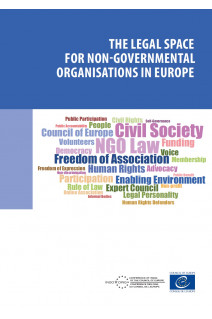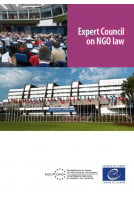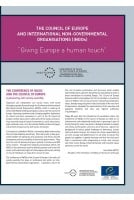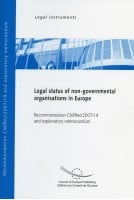Civil society’s perception of the implementation of Council of Europe CM Recommendation (2007)14 to Member States on the Legal Status of Non-Governmental Organisations in Europe
On 8 December 2021 the Expert Council on NGO Law organised a presentation and discussion of the study on the legal status of NGOs and on the implementation of the Recommendation (2007)14 of CoE Committee of Ministers to member states on the legal status of non-governmental organisations in Europe .
The work is based on an assessment done with CoE member states’ civil society, and also includes analysis from Kosovo[1] and Belarus. The analysis will enable the Expert Council identify where further steps to implement the Recommendation are needed.
The Expert Council on NGO Law (Expert Council) was established by the Conference of International Non-Governmental Organisations (INGOs) of the Council of Europe in 2008. The Recommendation (CM/Rec(2007)14) defines the minimum standards to be respected concerning the creation, management and the general activities of NGOs in member states of the organisation.
[1] *All references to Kosovo, whether the territory, institutions or population, in this text shall be understood in full compliance with United Nations Security Council Resolution 1244 and without prejudice to the status of Kosovo.
THE LEGAL SPACE FOR NON-GOVERNMENTAL ORGANISATIONS IN EUROPE I. INTRODUCTION II. RECOMMENDATION CM/REC(2007)14
A. Awareness of Recommendation CM/Rec(2007)14
B. Availability of text in an official language
C. Dissemination and use of Recommendation CM/Rec(2007)14
D. Objectives of NGOs
E. Establishing NGOs without legal personality
F. Founders, members and management of NGOs with legal personality
G. Establishment of an NGO with legal personality
H. Length of process
I. Suspending and dissolving NGOs
J. Foreign NGOs
K. Restrictions on foreign cooperation
L. Fundraising
M. Public benefit status
N. Publication and reporting requirements
O. Consultation obligations
III. THE PANDEMIC
A. Impact on fulfilling requirements
B. Good practices emerging
C. Being kept informed
D. Consultation
E. Impact on perception
F. Provision of public support
G. Impact on funding
IV. CONCLUSION APPENDIX1RECOMMENDATION CM/REC(2007)14 OF THE COUNCIL OF EUROPE COMMITTEE OF MINISTERS TO MEMBER STATES ON THE LEGAL STATUS OF NON-GOVERNMENTAL ORGANISATIONS N EUROPEI. Basic principles II. Objectives III. Formation and membership
A. Establishment
B. Statutes
IV. Legal personality
A. General
B. Acquisition of legal personality
C. Branches; changes to statutes
D. Termination of legal personality
E. Foreign NGOs
V. Management VI. Fundraising, property and public support
A. Fundraising
B. Property
C. Public support
VII. Accountability
A. Transparency
B. Supervision
C. Liability
VIII. Participation in decision makingAPPENDIX 2EXPLANATORY MEMORANDUM TO RECOMMENDATION CM/REC(2007)14 OF THE COMMITTEE OF MINISTERS TO MEMBER STATES ON THE LEGAL STATUS OF NON-GOVERNMENTAL ORGANISATIONS IN EUROPE Introduction Preamble I. Basic principles II. Objectives III. Formation and membership
A. Establishment
B. Statutes
C. Membership
IV. Legal personality
A. General
B. Acquisition of legal personality
C. Branches; changes to statutes
D. Termination of legal personality
E. Foreign NGOs
V. Management VI. Fundraising, property and public support
A. Fundraising
B. Property
C. Public support
VII. Accountability
A. Transparency
B. Supervision
C. Liability
VIII. Participation in decision making








